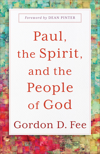
Overview
This contemporary classic by renowned scholar Gordon Fee explores the Spirit's significant role in Pauline life and thought.
After Fee published his magisterial God's Empowering Presence, he was asked to write a more accessible volume that would articulate Paul's priorities for experiencing the life of the Spirit in the church. Fee's bestselling introduction to Paul and the Spirit, Paul, the Spirit, and the People of God, went on to sell over 70,000 copies. This book by one of the greatest evangelical and Pentecostal New Testament interpreters of our time argues that the presence of the Spirit is, for Paul and for us, the crucial matter for the Christian life.
This repackaged edition features an updated design and packaging, includes new reflection questions, and adds a foreword by Dean Pinter, who commends the book to a new generation of readers.
After Fee published his magisterial God's Empowering Presence, he was asked to write a more accessible volume that would articulate Paul's priorities for experiencing the life of the Spirit in the church. Fee's bestselling introduction to Paul and the Spirit, Paul, the Spirit, and the People of God, went on to sell over 70,000 copies. This book by one of the greatest evangelical and Pentecostal New Testament interpreters of our time argues that the presence of the Spirit is, for Paul and for us, the crucial matter for the Christian life.
This repackaged edition features an updated design and packaging, includes new reflection questions, and adds a foreword by Dean Pinter, who commends the book to a new generation of readers.
Table of Contents
Contents
Foreword by Dean Pinter
Overture--An Invitation to Read Paul Anew
1. A "Theology" of the Spirit? The Spirit in Pauline Theology
2. God Revisits His People--The Spirit as the Renewed Presence of God
3. The Holy Who? The Spirit as Person
4. God in Three Persons--The Spirit and the Trinity
5. The Beginning of the End--The Spirit as Evidence of the "Presence of the Future"
6. A People for His Name--The Spirit and the People of God
7. Conversion: Getting In (Part 1)--The Spirit and the Hearing of the Gospel
8. Conversion: Getting In (Part 2)--The Spirit at the Entry Point
9. Conversion: Staying In (Part 1)--The Spirit and Pauline Ethics
10. Conversion: Staying In (Part 2)--The Fruit of the Spirit
11. The Ongoing Warfare--The Spirit against the Flesh
12. Power in Weakness--The Spirit, Present Weakness, and Prayer
13. To the Praise of His Glory--The Spirit and Worship
14. Those Controversial Gifts? The Spirit and the Charismata
15. Where to from Here? The Spirit for Today and Tomorrow
Appendix--Spirit Baptism and Water Baptism in Paul
Index
Foreword by Dean Pinter
Overture--An Invitation to Read Paul Anew
1. A "Theology" of the Spirit? The Spirit in Pauline Theology
2. God Revisits His People--The Spirit as the Renewed Presence of God
3. The Holy Who? The Spirit as Person
4. God in Three Persons--The Spirit and the Trinity
5. The Beginning of the End--The Spirit as Evidence of the "Presence of the Future"
6. A People for His Name--The Spirit and the People of God
7. Conversion: Getting In (Part 1)--The Spirit and the Hearing of the Gospel
8. Conversion: Getting In (Part 2)--The Spirit at the Entry Point
9. Conversion: Staying In (Part 1)--The Spirit and Pauline Ethics
10. Conversion: Staying In (Part 2)--The Fruit of the Spirit
11. The Ongoing Warfare--The Spirit against the Flesh
12. Power in Weakness--The Spirit, Present Weakness, and Prayer
13. To the Praise of His Glory--The Spirit and Worship
14. Those Controversial Gifts? The Spirit and the Charismata
15. Where to from Here? The Spirit for Today and Tomorrow
Appendix--Spirit Baptism and Water Baptism in Paul
Index
Endorsements
"Gordon Fee's earlier scholarly tome on Paul's theology of the Holy Spirit is without dispute the most thorough work on the subject ever yet produced. The fruit of that detailed labor is made accessible to a wider range of readers in his Paul, the Spirit, and the People of God. For anyone interested in this major Pauline theme, and in the work of the Spirit, this work is indispensable. It helps us reframe in more biblical terms our thinking about the central role of the Spirit."
Craig S. Keener, F. M. and Ada Thompson Professor of Biblical Studies, Asbury Theological Seminary; author of Gift and Giver: The Holy Spirit for Today
"The past decades have demonstrated an ongoing interest in topics such as Paul's relationship to the Jewish law and the possibilities for how Paul's view of Christian ethics affects Christian life today. In Paul, the Spirit, and the People of God, Fee insists that the Spirit is the key to answering such questions, as the experience of the Spirit's presence was the best Jewish evidence available for Paul's argument that God's future (the kingdom of God) was available to God's people in the present. If you long to see more of the Holy Spirit in the pages of Scripture as well as in your own life, this book is for you."
Holly Beers, associate professor of religious studies, Westmont College
"Fee, truly one of our master exegetes, has put steel and sinew into the words Spirit, spirit, and spiritual. His accurate, fresh, and passionate recovery of the place and meaning of Spirit in Paul and for us Christians is a provocative stimulus and reliable guide to the recovery of the experienced presence of God in our lives."
Eugene H. Peterson†, Regent College
Author
Gordon D. Fee
Gordon D. Fee (PhD, University of Southern California) is professor emeritus of New Testament studies at Regent College in Vancouver, British Columbia. Prior to Regent, he taught for twelve years at Gordon-Conwell Theological Seminary. He coauthored the bestselling How to Read the Bible for All Its Worth and is the author of numerous books, including Pauline Christology, God's Empowering Presence, Jesus the Lord according to Paul the Apostle, and commentaries on 1 Corinthians, Philippians, 1 and 2 Timothy, Titus, and Revelation.